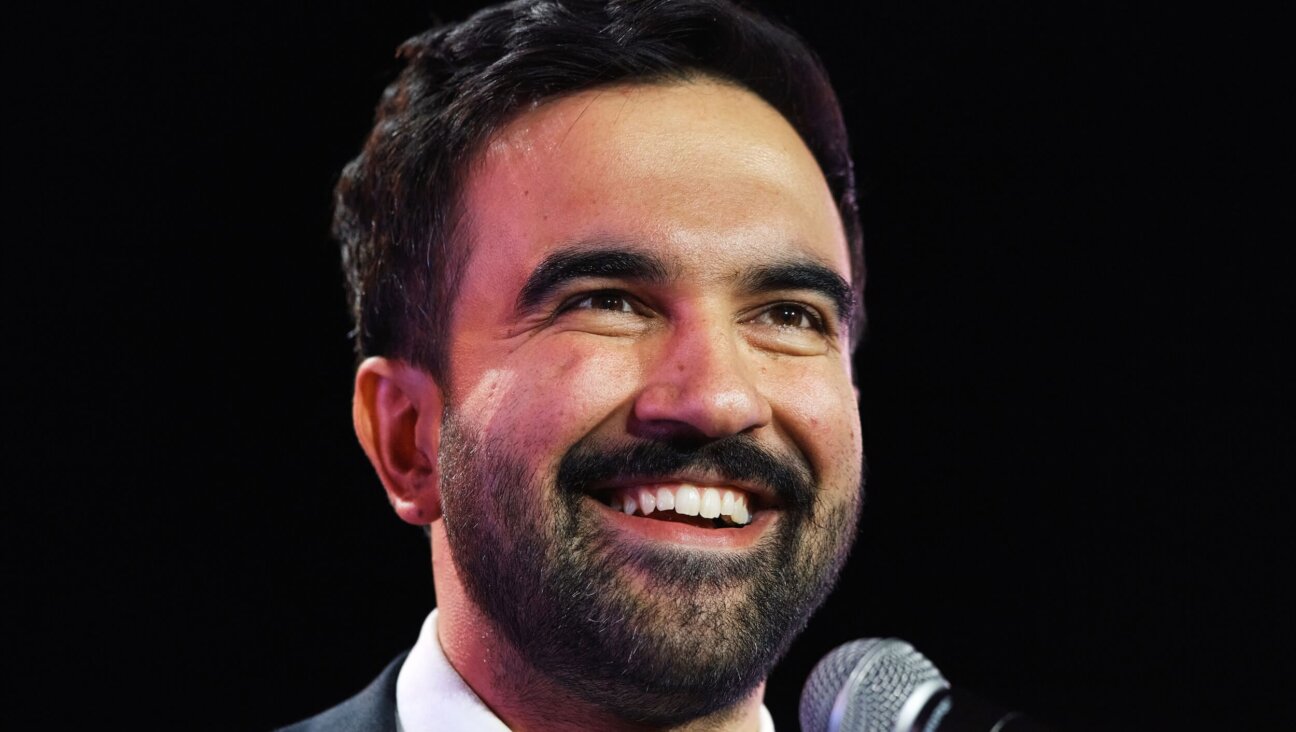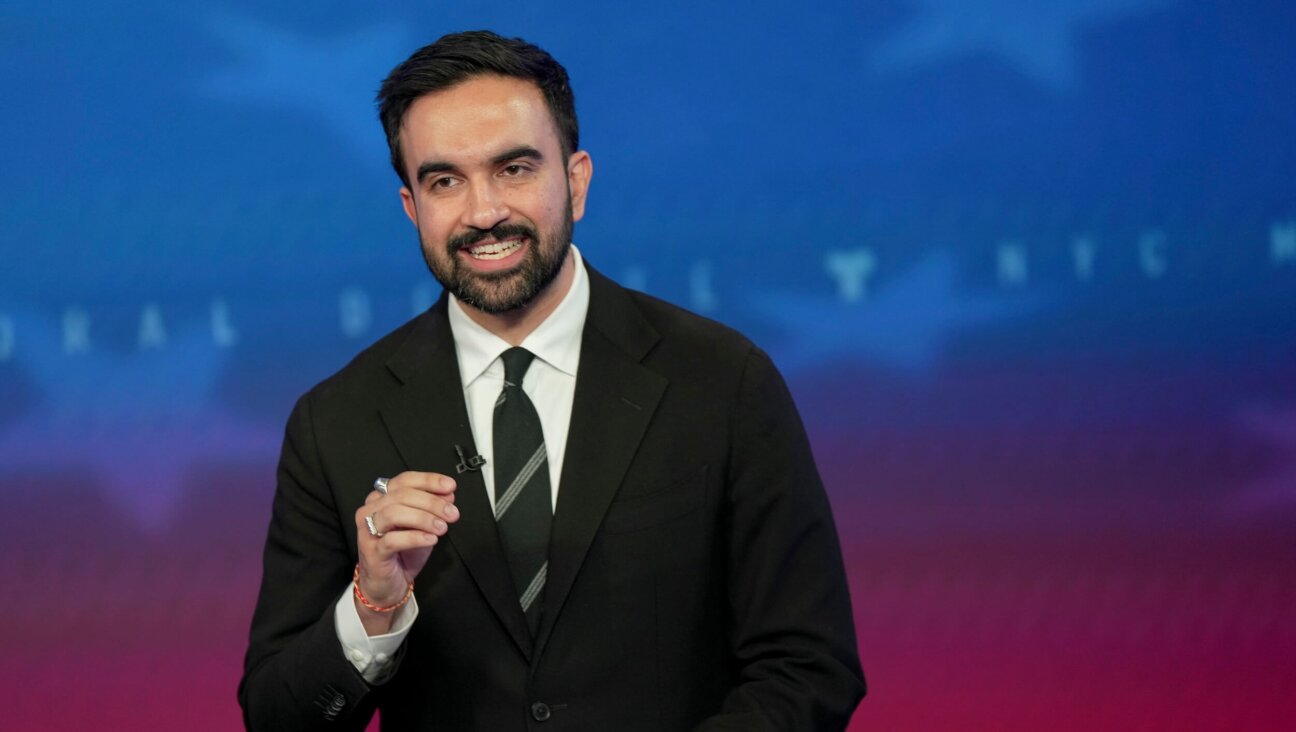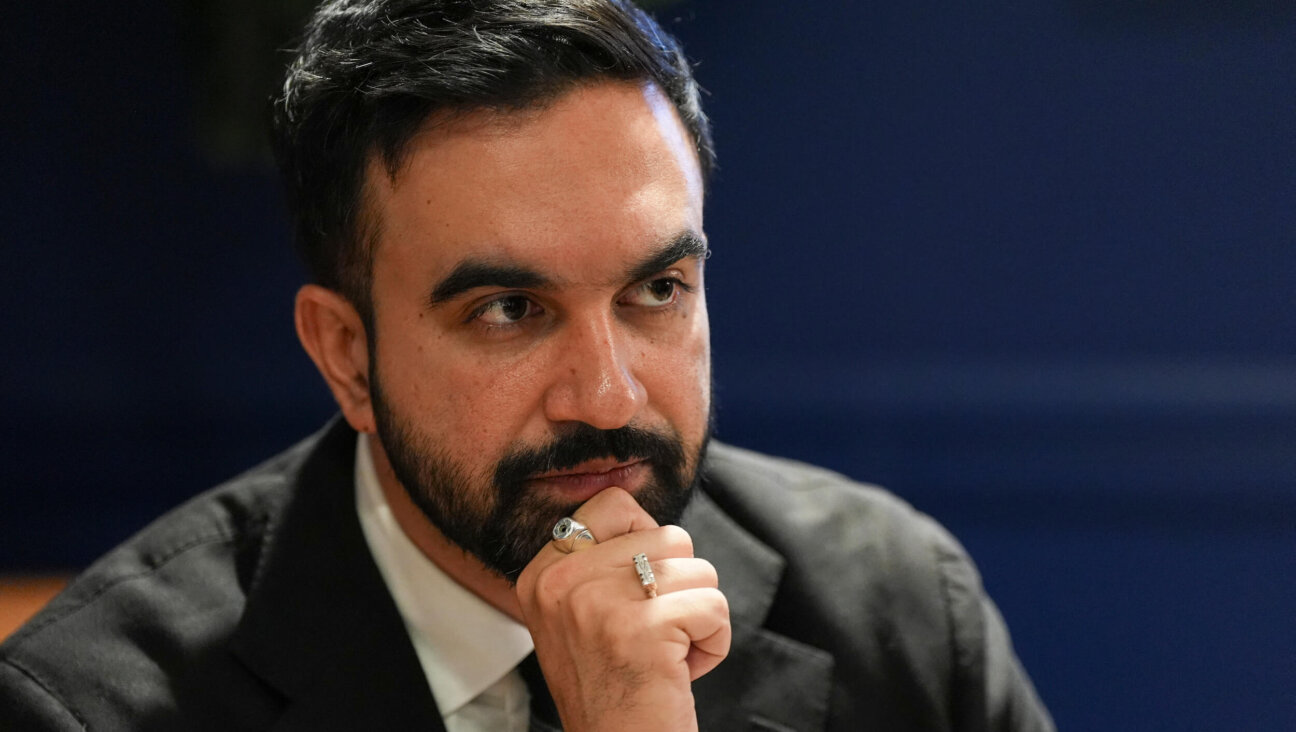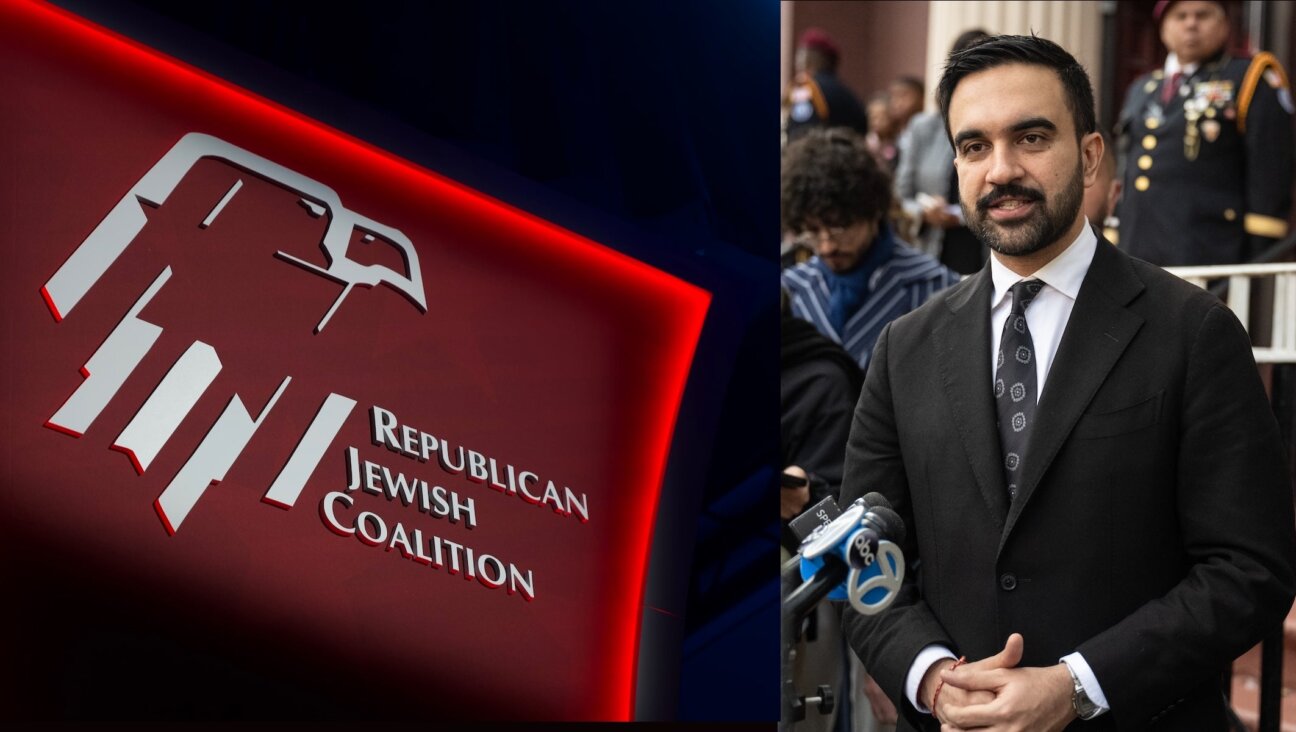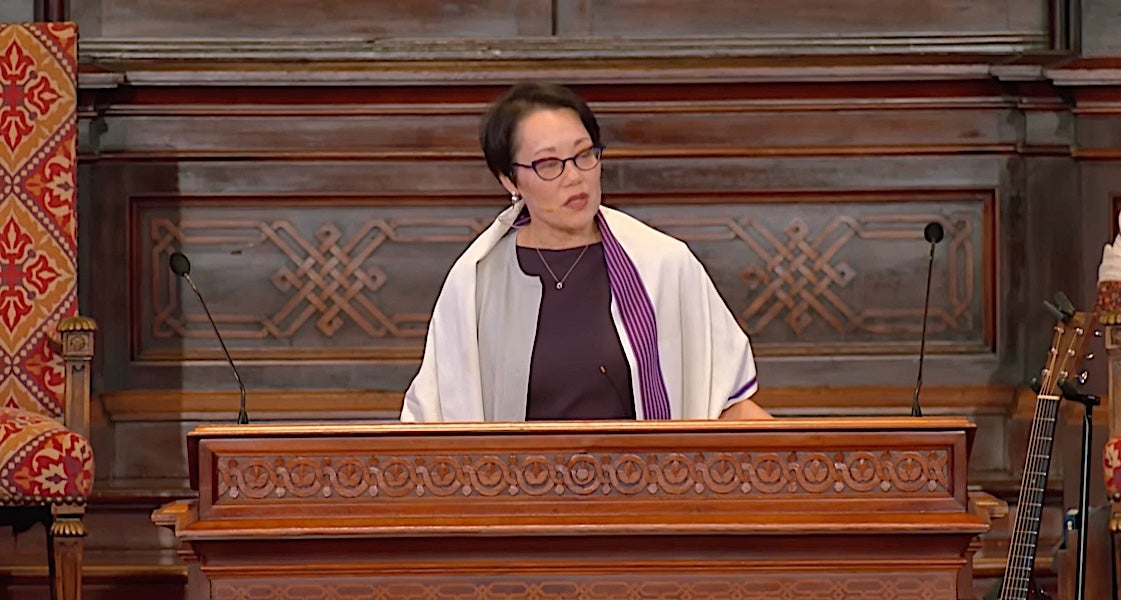EXCLUSIVE: Nazi-Allied Group Claims Top Trump Aide Sebastian Gorka As Sworn Member
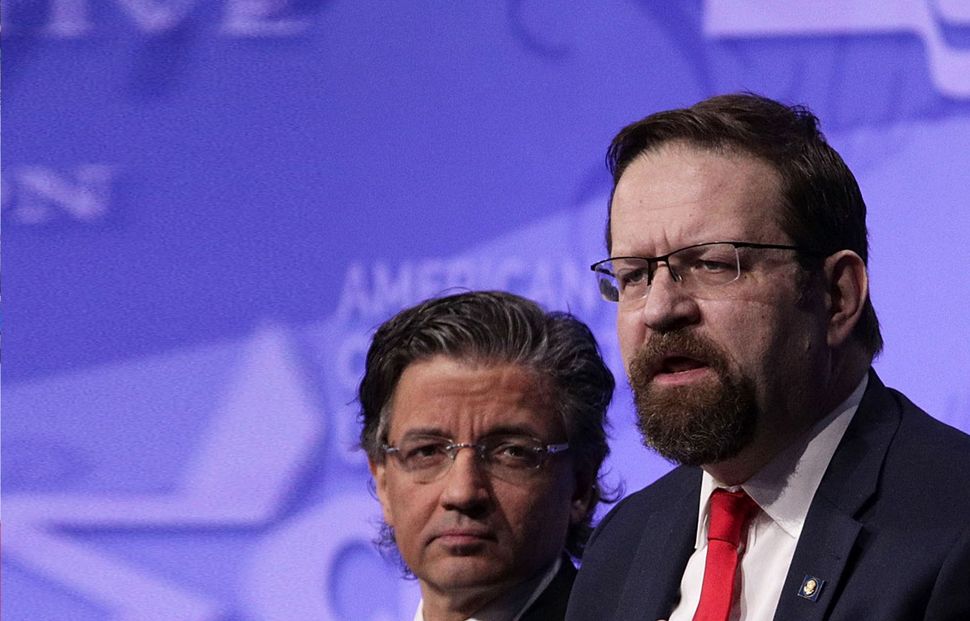
Image by Getty Images
Sebastian Gorka, President Trump’s top counter-terrorism adviser, is a formal member of a Hungarian far-right group that is listed by the U.S. State Department as having been “under the direction of the Nazi Government of Germany” during World War II, leaders of the organization have told the Forward.
The elite order, known as the Vitézi Rend, was established as a loyalist group by Admiral Miklos Horthy, who ruled Hungary as a staunch nationalist from 1920 to October 1944. A self-confessed anti-Semite, Horthy imposed restrictive Jewish laws prior to World War II and collaborated with Hitler during the conflict. His cooperation with the Nazi regime included the deportation of hundreds of thousands of Jews into Nazi hands.
Gorka’s membership in the organization — if these Vitézi Rend leaders are correct, and if Gorka did not disclose this when he entered the United States as an immigrant — could have implications for his immigration status. The State Department’s Foreign Affairs Manual specifies that members of the Vitézi Rend “are presumed to be inadmissible” to the country under the Immigration and Nationality Act.
Gorka — who Vitézi Rend leaders say took a lifelong oath of loyalty to their group — did not respond to multiple emails sent to his work and personal accounts, asking whether he is a member of the Vitézi Rend and, if so, whether he disclosed this on his immigration application and on his application to be naturalized as a U.S. citizen in 2012. The White House also did not respond to a request for comment.
But Bruce Einhorn, a retired immigration judge who now teaches nationality law at Pepperdine University, said of this, “His silence speaks volumes.”
The group to which Gorka reportedly belongs is a reconstitution of the original group on the State Department list, which was banned in Hungary until the fall of Communism in 1989. There are now two organizations in Hungary that claim to be the heirs of the original Vitézi Rend, with Gorka, according to fellow members, belonging to the so-called “Historical Vitézi Rend.” Though it is not known to engage in violence, the Historical Vitézi Rend upholds all the nationalist and oftentimes racial principles of the original group as established by Horthy.
Einhorn said these nuances did not relieve Gorka of the obligation, if he’s a member, to disclose his affiliation when applying for his visa or his citizenship.
“This is a group that advocates racialist nativism,” said Einhorn. If Gorka did not disclose his affiliation with it, he said, this would constitute “failure to disclose a material fact,” which could undermine the validity of both his immigration status and claim to citizenship.
“It’s a material fact that, if disclosed, would have provoked a significant inquiry into the specific post-war role of this organization and Gorka’s activities in it,” he said.
Before serving 17 years as an immigration judge, Einhorn was deputy chief at the Justice Department’s Office of Special Investigations. The unit, which has since been disbanded, was charged with finding and deporting Nazis and members of other extremist groups who entered America illegally by lying about or hiding their background. He noted that individuals who apply for both visas and citizenship are specifically asked to name all organizations they belong to due to the government’s interest in scrutinizing those affiliated with extremist groups, and in particular those on the State Department’s list.
If Gorka did not disclose his Vitézi Rend affiliation, said Einhorn, he thereby “foreclosed the opportunity for U.S. officials to pursue that inquiry with him.” No statute of limitations exists for such violations, he noted.
Einhorn stressed that Gorka would have defenses in such a case; he might argue the chances were small that immigration and naturalization officials — who are not extremism experts or historians — would have recognized the nature of the group and questioned him even if he disclosed his affiliation. “There would have to be clear and convincing evidence that had he told the truth… it would have led to a meaningful inquiry that could have kept him out of the country.”
But Einhorn stressed: “My view is that it would be a legitimate case — difficult and challenging, but I believe winnable.”
Gorka, who is a deputy assistant to the president, first provoked questions about his relationship to the Vitézi Rend after he publicly brandished its medal on his lapel at a presidential inauguration ball January 20. When questions were raised about this in February on the news website Lobelog and elsewhere, he explained it as a gesture of honor to his late father.
“In 1979 my father was awarded a declaration for his resistance to a dictatorship,” he told Breitbart News then. “Although he passed away 14 years ago, I wear that medal in remembrance of what my family went through and what it represents today, to me, as an American.”
But the Forward’s inquiry into Gorka’s relationship with the Vitézi Rend suggests that Gorka’s explanation is, at best, incomplete:
Gorka, who pledged his loyalty to the United States when he took American citizenship in 2012, is himself a sworn member of the Vitézi Rend, according to both Gyula Soltész — a high-ranking member of the Vitézi Rend’s central apparatus — and Kornél Pintér — a leader of the Vitézi Rend in Western Hungary who befriended Gorka’s father through their activities in the Vitézi Rend.
Soltész, who holds a national-level leadership position at the Vitézi Rend, confirmed to the Forward in a phone conversation that Gorka is a full member of the organization.
“Of course he was sworn in,” Pintér said, in a phone interview. “I met with him in Sopron [a city near Hungary’s border with Austria]. His father introduced him.”
“In today’s world it is rare to meet anyone as well-bred as Sebastian or his father, Pali,” he added.
If correct, Gorka’s membership in the order is notable because, as Pintér and other members explained, affiliation is possible only via a solemn initiation rite in which new members take an oath swearing undying allegiance to the Hungarian nation and the Vitézi Rend’s goals:
“I, Vitez [name], swear on the Holy Crown that I know the Order’s goals and code, and based on the orders of the Captain and Order Superiors will follow them for the rest of my life. I never betrayed my Hungarianness, and was never and am not currently a member of an anti-national or secret organization. So help me God.”
Several commentators also noted that in his 2008 doctoral dissertation at Hungary’s Corvinus University, Gorka presented his name as Sebastian L. v. Gorka. The “v.” is an initial used by members of the Vitézi Rend.
But Gorka did not use the initial only in academic papers.
In June 2011, Gorka testified in front of the House Armed Services Committee. His official testimony did not list his name as Sebastian L. Gorka, but rather as Dr. Sebastian L. v. Gorka.
“Of course, only after the oath,” György Kerekes, a current member of the Vitézi Rend, told the Forward when asked if anyone may use the initial “v.” without going through the Vitézi Rend’s application process and an elaborate swearing-in ceremony.
As the son of a member of the Vitézi Rend, Gorka is eligible to apply for membership. But membership is not bestowed automatically, and he cannot use the initial in his name without actively applying for membership and taking the formal oath to the organization.
Gorka’s self-identification to a congressional committee as Dr. Sebastian L. v. Gorka thus indicates that Gorka either misrepresented his identity to Congress in 2011 or is currently misrepresenting his affiliation with the Vitézi Rend, potentially having taken an oath to Hungarian nationalist and racist principles.
The Vitézi Rend, which was established in 1920 for Horthy’s loyal followers, is listed by the State Department as one of many groups in Germany and the countries it occupied as collaborationist “criminal organizations” with the Nazis as determined by the post-war International Military Tribunal at Nuremberg. The group was among those Horthy rewarded with real estate taken from hundreds of thousands of Jews his government deported to Nazi concentration camps.
Dissolved in Hungary after World War II under the terms of the Allies’ armistice with Hungary, it was reconstituted by veterans’ groups in exile, including prewar members of the group appointed by Horthy. It was re-established inside Hungary after communism’s collapse in 1989. According to State Department guidelines, while Vitézi Rend membership “does not automatically render the alien ineligible for a visa, the applicant has the burden of establishing that, despite being a member of a designated criminal organization, he or she did not participate in activities that would fall within the purview of the Immigration and Nationality Act. The guidelines cite a provision of the act barring entry to the United States to “participants in Nazi persecution, genocide, or the commission of any act of torture or extrajudicial killing.”
Gorka, who is 46, could not have been part of any World War II killings. But the provisions reflect the State Department’s understanding of the Vitézi Rend’s historical nature.
The group’s mission emphasized not only loyalty to Hungary and nationalist ideas, but also an ideology of racial superiority. One of the original aims of the Vitézi Rend was to “ensure such might to the Hungarian race, which with tremendous power strikes every subversive state and anti-national movement,” Horthy said in a speech to new members in 1921.
The Hungarian dictator, whom Vitézi Rend members still lionize on their websites as the order’s founding leader and ideological guide, added, “Let the Vitézi Rend be the pride of the Turan race and our homeland, but if necessary, its sharp cutting sword.” “The Turan race” refers to , a theory popular among the country’s far-right and fascist groups whereby Hungarians are thought to be a race descended from tribes that migrated from Asia.
Members of the Vitézi Rend should practice “love of their race,” Horthy said in 1926, in a speech during a swearing-in ceremony for new members.
“Whoever lets another take his place is committing a crime against his race,” Horthy emphasized eight years later, in a June 1934 speech to members of the Vitézi Rend.
Nearly a century later, the Vitézi Rend has not left its legacy of racism behind. Horthy is revered among the organization’s members. His speeches are quoted on Vitézi Rend websites, and his original goals for the organization are highlighted.
As historian Eva S. Balogh notes, the organization’s formal slogan — “I believe in one God, I believe in one country, I believe in the divine everlasting truth, I believe in the resurrection of Hungary” — advocates a return to Hungary’s pre-World War I borders; a territory that includes parts of modern-day Romania, Ukraine, Slovakia and Serbia.
Today, the organization presents itself as a “conservative, right-wing” group independent of party politics. But some of the organization’s newer members also openly embrace racist and anti-Semitic views. Footage on YouTube of a 2012 swearing-in ceremony of new members reveals Zsolt Bayer, a publicist and writer known as one of Hungary’s most outspoken anti-Semites, being initiated as a member.

A Lifelong Oath: A senior Vitézi Rend member initiates publicist and writer Zsolt Bayer, known as one of Hungary’s most outspoken anti-Semites, into the order in 2012.
In 2013, Hungary’s highest court that one of Bayer’s articles was anti-Semitic. In a 2016 article that earned the protest of Israel’s ambassador to Hungary, the Vitézi Rend member asked, “Why are we surprised that the simple peasant” didn’t interfere with the deportation of Hungarian Jews to Nazi concentration camps “when the ‘Jews’ broke into his village and beat the priests to death or hung them from lamp posts, the judge and everyone they didn’t like…?”
Though Gorka did not respond to inquiries about his relationship to the Vitézi Rend, when the Forward revealed in February that he had co-founded a political party together with former members of the Hungarian far-right Jobbik party and wrote articles for a Hungarian paper known for its anti-Semitism, the White House aide responded on Twitter by quoting a friend: “Sharing a room w Helen Keller does not make 1 blind; sharing a subway car w Albert Einstein does not make 1 a genius.”
But Einhorn, the immigration expert, stressed a larger moral principle was at stake.
“Gorka is part of an administration issuing travel bans against countries and people as a whole,” he said. “For someone who is part of this effort to not answer your question [about his membership] and yet support what’s gong on in the West Wing where he works is the height of hypocrisy. The administration that makes so much of protecting us from extremists while looping the guilty in with the innocent should at least require its officials tell the truth.”
Gorka’s inconsistent record on his affiliation with the Vitézi Rend is one of several ways in which the deputy assistant to the president may be misconstruing his past.
Adrian Weale, who served as a British Intelligence Corps officer in the 1980s, traced how Gorka’s claims to have worked on counter-terror issues for British Military Intelligence in Northern Ireland and on collecting evidence for the war crimes tribunal set up after the collapse of Yugoslavia are unlikely to be true. According to Weale, Gorka “has never been an operational practitioner of counter-terrorism.”
At the same time, Gorka’s credentials as an academic expert in terrorism have been widely questioned. His doctoral dissertation has been dissected by various academics who say he is not an expert in their field, has never lived in a Muslim-majority country, does not speak Arabic and has avoided publishing any serious, peer-reviewed academic research.
Gorka’s doctoral supervisor in Hungary, András Lánczi, is an expert on political philosophy and Hungarian politics, but has never worked on terrorism, counter-terror or Islam-related research.
Writing in Foreign Policy, Colin Kahl, a deputy assistant to former President Obama and national security adviser to his vice president, Joe Biden, noted that it appears Gorka does not currently possess Top Secret or a Top Secret/Sensitive Compartmented Information security clearance. Nevertheless, in his frequent appearances in the media Gorka presents himself as having insight into decision making and threat intelligence to which only someone with a clearance would legally have access.
Gorka, who worked in Hungary’s Ministry of Defense and served in the British military, became a U.S. citizen only five years ago.
Others before Gorka have become American naturalized citizens and have quickly taken on senior government roles. One example is Martin Indyk, who was born in London and raised in Australia but nevertheless became a special assistant to President Clinton and served on the National Security Council before becoming the U.S. ambassador to Israel.
But Gorka’s position is distinguished by his past work for foreign governments, involvement with nationalist and far-right groups and figures, and, perhaps most important, for security investigators, inconsistencies in how he portrays his own past.
Lili Bayer reports for the Forward from Budapest. Contact her at [email protected]
Larry Cohler-Esses is the Forward’s editor for special projects. Contact him at [email protected]
Sebastian Gorka resigned from his White House post on Friday, August 26, 2017, with an angry broadside at enemies who he claimed have hijacked President Trump’s administration.

